There are many possible lessons that can be drawn from this new study on elite college admissions but however you slice the data, it reveals that it’s very good to be rich if you want to get into a top school. Take a look at this graph. The x-axis is parent’s income. The y-axis is half-as-likely to be admitted up to twice-as-likely to be admitted.
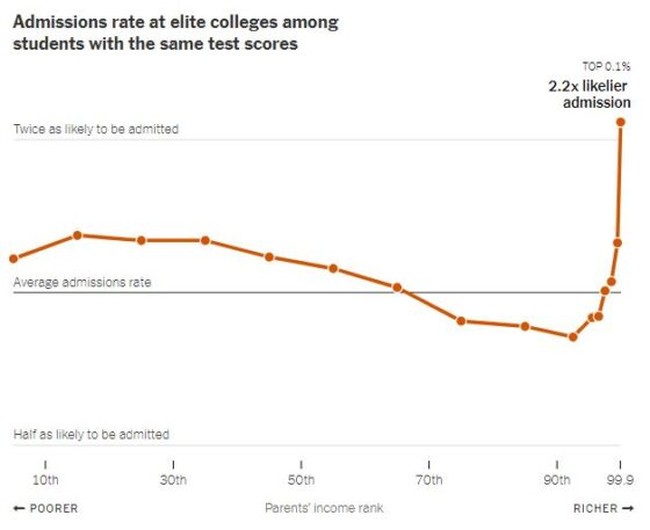
There are all sorts of caveats here but the basic idea is that people who all scored the same on the SAT have a much higher chance of getting in if they are in the top 1% and somewhat lower chance if they are in the upper-middle class. What accounts for the difference? Here’s how the NY Times reports the outcome:
The new data shows that among students with the same test scores, the colleges gave preference to the children of alumni and to recruited athletes, and gave children from private schools higher nonacademic ratings. The result is the clearest picture yet of how America’s elite colleges perpetuate the intergenerational transfer of wealth and opportunity…
In effect, the study shows, these policies amounted to affirmative action for the children of the 1 percent, whose parents earn more than $611,000 a year. It comes as colleges are being forced to rethink their admissions processes after the Supreme Court ruling that race-based affirmative action is unconstitutional.
We’ll come back to nonacademic ratings in a moment but first, note that outstanding test scores of the kind that are needed to get into top schools are not evenly distributed. On this graph the x-axis is the same as the graph above. As you can see, students who get a 1500 or higher on the SAT are disproportionately at the top of the parent’s income scale.
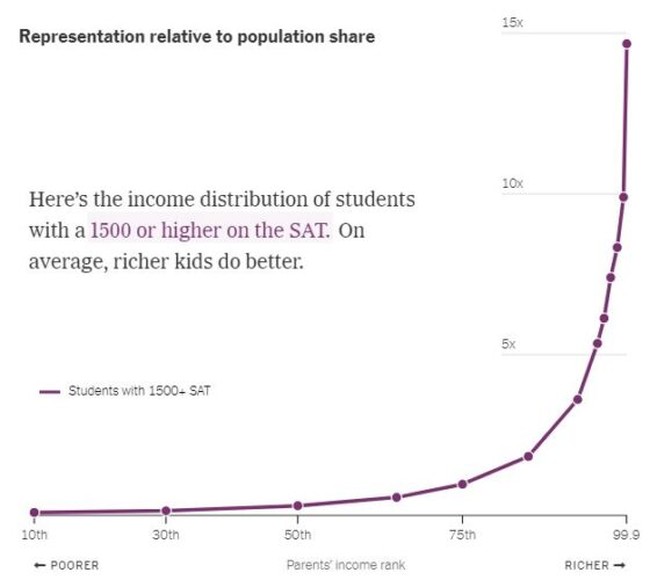
The chances of getting a top score is much higher in the top 10%, which could be the result of several things. Maybe it’s because these kids went to great prep schools or took test prep classes that other parents couldn’t afford. I also wouldn’t rule out the possibility of cheating of some kind though I’m not sure how you could pull that off. In any case, top scores are not evenly distributed across the range of incomes. This follow-up graph shows that admissions rates are even higher at top income levels than top scores can account for. Notice the x-axis on this graph has changed. This is just the top 10% of earners.
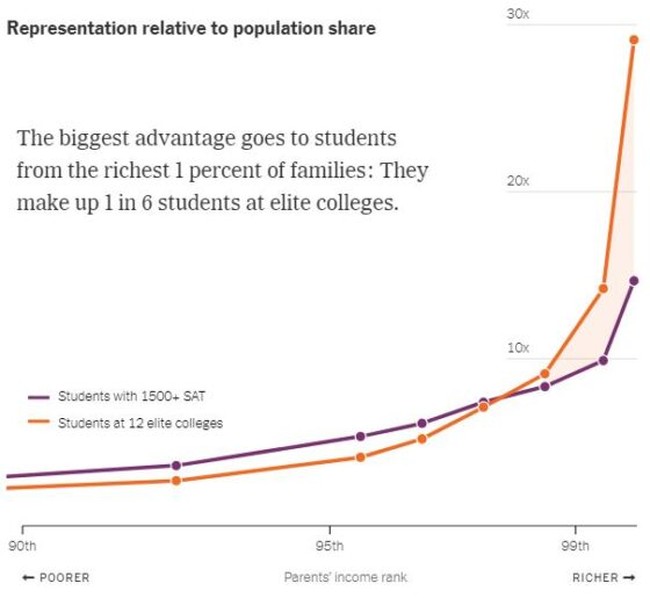
But again, we have to remember that test scores aren’t the only factor here. In other words, admissions officers aren’t looking at SAT scores and then setting everyone whose parents are in the top 1% of earners in a special pile. Instead, there are other factors which are driving the admissions of the students of top earners. One of the things this study looked at was the actual ratings given to applicants by several top schools (they wouldn’t say which one they were working with).
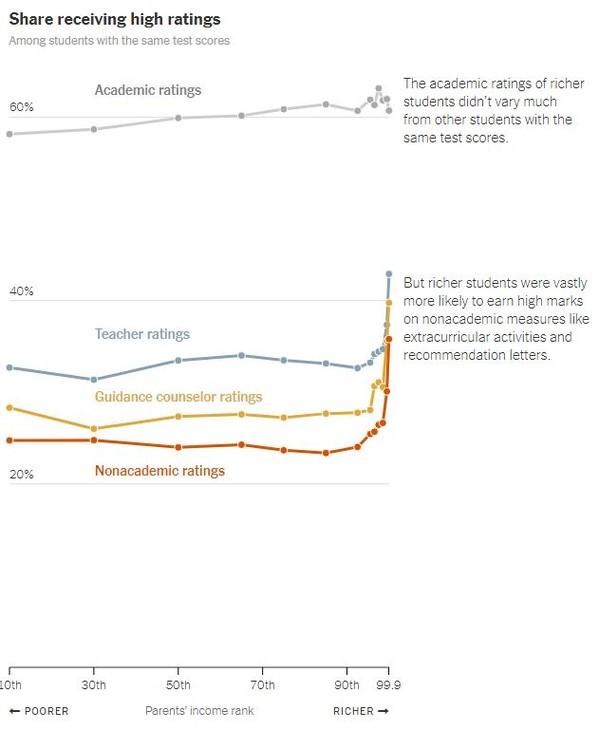
As the Times sums it up: “Students from the top 1 percent with the same test scores did not have higher academic ratings. But they had significantly higher nonacademic ratings.” So why is this happening? It may be that the very rich are more likely to go to elite prep schools which will give students glowing reviews.
The biggest contributor was that admissions committees gave higher scores to students from private, nonreligious high schools. They were twice as likely to be admitted as similar students — those with the same SAT scores, race, gender and parental income — from public schools in high-income neighborhoods. A major factor was recommendations from guidance counselors and teachers at private high schools…
Recommendation letters from private school counselors are notoriously flowery, he said, and the counselors call admissions officers about certain students.
My own view is that the kids from wealthy families probably are more likely to excel in school for a bunch of reasons. The test scores seem to back that up but so long as the excellence being measured is coming from the students themselves, that fine with me. It’s still their academic merit that is being considered even if the rich have advantages instilling that merit in their kids.
However, recommendation letters are different. How many kids can the school counselor really know and recommend? I went to a high school with more than 2,000 students. I only met the councilor once, when I was applying for colleges. Of the 600 or so students in my graduating class, how many could she really recommend?
Also, there’s a pretty obvious amount of self-interest in an elite private school offering students who come from the wealthiest families lots of attention. Those are the families paying full tuition and who have the potential to make gifts to the school above and beyond tuition. Practically speaking, it makes sense that counselors would have a lot of positive things to say about those particular students. In fact, pissing off the parents of one of those students could be a problem for their own career.
Obviously that’s very different from the situation in public schools. Those counselors likely have more kids, fewer wealthy parents and don’t have to care about them at all if they don’t want to. It literally won’t benefit them to do so.
The recommendation letters from private school counselors really do feel like a cheat, i.e. something produced by another adult whose job is to please the wealthy parents or at least not disappoint them. Those recommendations may accurately reflect some merit of the applicant or they may not. Maybe the counselors are just good writers who know what college admissions staffers want to hear.
Bottom line: Standardized test scores are not the enemy of fairness. Some students may get extra help or go to better schools but at the end of the day the test is still a measure of what they actually know. Non-academic ratings written by paid adults seem much more like a system that is open to abuse and favoritism and that’s what seems to be happening.
Not sure how you can look at this data, ostensibly be interested in either meritocracy or equality, and want to move away from standardized tests. It's the subjective measures that are most slanted in favor of the rich kids.https://t.co/r4rNYBnrfK pic.twitter.com/S8w8HQ0yz9
— Nate Silver (@NateSilver538) July 24, 2023
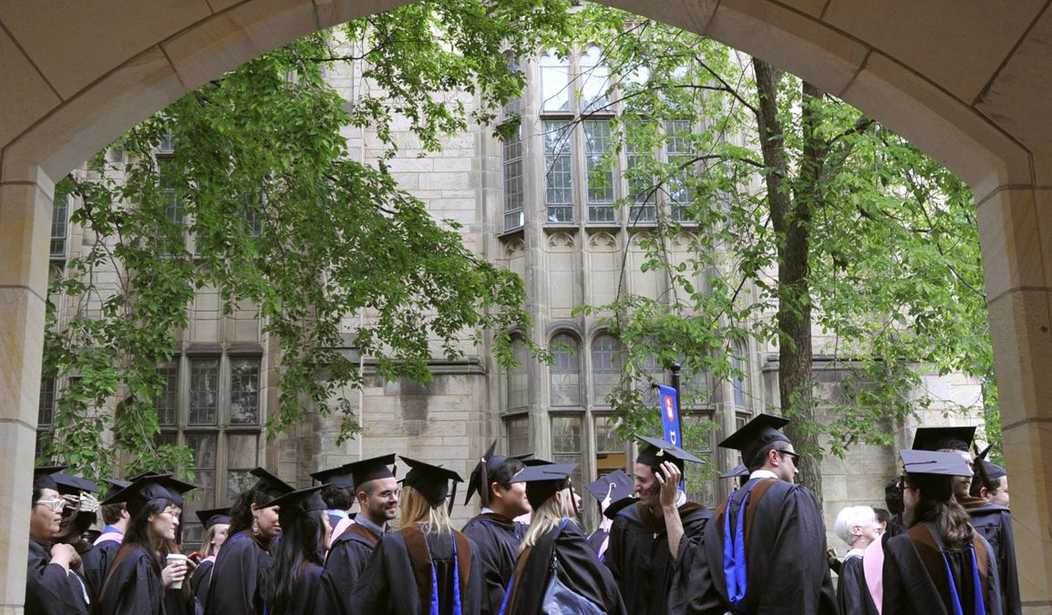

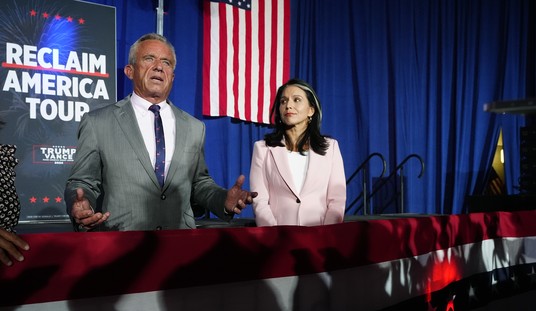




Join the conversation as a VIP Member